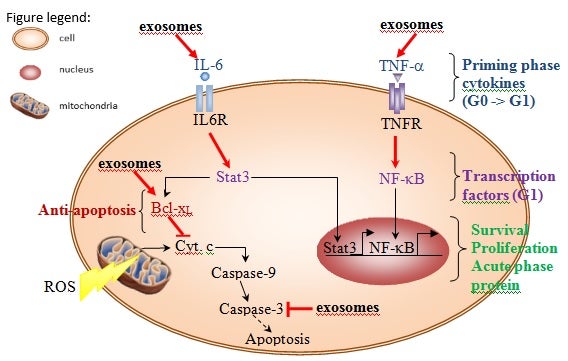Exosomes promote liver regeneration
HO Han Kiat (Group Leader, Pharmacy) () September 16, 201416 Sep 2014. Scientists in NUS discovered the mesenchymal stem cell-derived exosomes promote liver regeneration in drug-induced liver injury models.
Drug-induced liver injury (DILI) is a major clinical problem arising as a side effect of taking medications.Today, there is no therapeutically proven hepatoprotective agent as a response measure. A team led by Prof HO Han Kiat from Department of Pharmacy in NUS has addressed this gap by exploring the potential of mesenchymal stem cell (MSC)-derived exosomes, an approach which has found early success in acute heart injury. Using both in vitro and animal models, the team has demonstrated a remarkable role of such exosomes in mitigating the extent of liver injury after a chemical insult. Further evaluation revealed that this effect arises from its ability to stimulate liver regenerative signals and cell proliferation.
This promising discovery of MSC-derived exosomes is a major step towards a non-cell-based adjunctive therapy for the treatment of liver injury. Exosomes hold several benefits as compared to other treatments, e.g.,liver transplantation:(1) Exosomes are not whole cells and do not elicit untoward immune reactions for the recipient; (2) they are non-viable and hence display low risk for infection; (3) they are entirely endogenous and would avert toxicity arising from administering xenobiotics. Furthermore, human embryonic stem cell lines being the source of the exosomes, contribute to a reproducible, scalable and relatively inexpensive approach to generate large supplies to meet clinical needs (see Figure).
In summary, these results suggest that MSC-derived exosomes can elicit hepatoprotective effects against toxicants-induced injury mainly through activation of proliferative and regenerative responses.

The figure shows how exosomes exert their effect through activating various echelons of cell signals, leading to enhanced survival during liver injury. They activate cytokines such as TNF-a and IL-6 as the priming signals towards liver regeneration. Downstream transcription factors such as NF-kB and Stat3 propagate the signal and commit the cells for elevated cell proliferation and resistance to apoptosis respectively. (Picture credit: HO HK)
Reference
Tan CY. “Mesenchymal stem cell-derived exosomes promote hepatic regeneration indrug-induced liver injury models.” Stem Cell Research & Therapy 5 (2014) 76.


